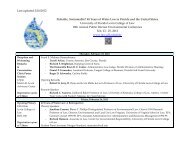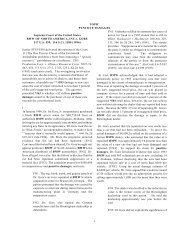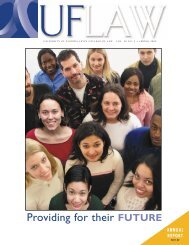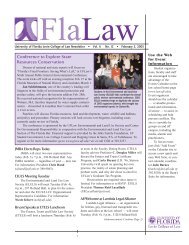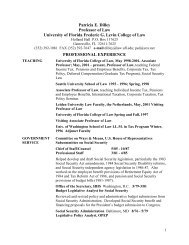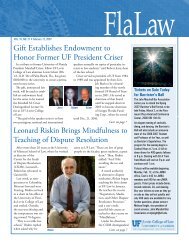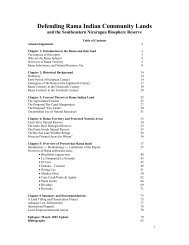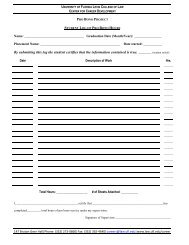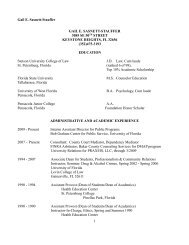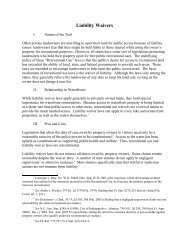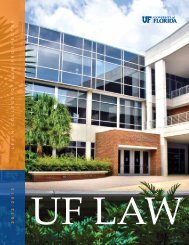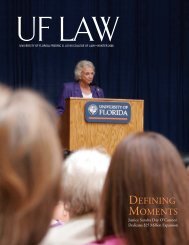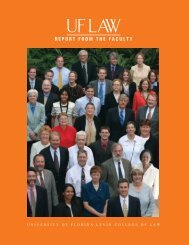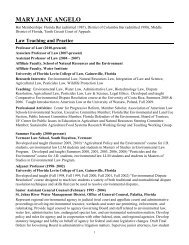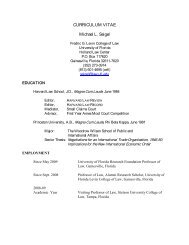Download Magazine - Levin College of Law - University of Florida
Download Magazine - Levin College of Law - University of Florida
Download Magazine - Levin College of Law - University of Florida
Create successful ePaper yourself
Turn your PDF publications into a flip-book with our unique Google optimized e-Paper software.
question, but it was probably theone question I really didn’t wantto answer,” Aronovitz said. “I gotit out <strong>of</strong> my mouth, I saw himnodding and that was a big confidencebooster.”Despite pointed questioningfrom the bench, the competitorswere confident in their answersbecause <strong>of</strong> weeks <strong>of</strong> practice facingrigorous grilling from theirpr<strong>of</strong>essors.“What really made it mucheasier than you would havethought was that the questionsthe pr<strong>of</strong>essors asked us in practicewere hard-hitting, adversarial,trying to get us to messup, and that prepared us to talkto these judges and justice whodidn’t want to do that,” Combestsaid. “They just wanted to talkback and forth. We had seen theworst, and anything less than thatwas just pleasant.”That’s not to say the juristsdidn’t ask the competitors sometough questions, probing theirarguments to find chinks in theirreasoning regarding complexlegal questions. As an example,Roberts questioned Davis on hisargument for the respondent thata four-prong approach shouldbe adopted when determiningwhether a message on a stateautomobile license tag is governmentor private speech.“The problem with multifactortests, <strong>of</strong> course, is thatthey delegate a huge amount <strong>of</strong>discretion to the judiciary,” saidRoberts. “When you have fourfactors, they can be manipulatedin any way, and so you’re transferringthe determination fromthe legislature to the courts aboutwhat types <strong>of</strong> policies the governmentcan support and promote.Isn’t that problematic?”During deliberations, UF<strong>Law</strong> Pr<strong>of</strong>essor Lyrissa Lidskyaddressed the audience to outlinethe constitutional elements <strong>of</strong> thecase, stressing its importance despiteits hypothetical nature. Shenoted <strong>Florida</strong> was the first stateto have a “Choose Life” licenseplate and is also considering alicense plate with the words “IBelieve” with a picture <strong>of</strong> a cross.Although the “I Believe” tag hasbeen stalled in <strong>Florida</strong>, SouthCarolina recently approved an “IBelieve” license plate, and a lawsuithas already been filed in thematter, she said.“This is a very importantissue, it’s a hot issue, and somevery smart people in our appellatecourts have split on theconstitutionality <strong>of</strong> the issue,”Lidsky said.Although the bench eventuallyruled for the petitioner, Robertssaid all <strong>of</strong> the students performedwell.“We unanimously decided thatthere was not a bad one amongthem,” Roberts said. “That’s notalways the case, so we appreciatevery much, as we do in our dayjobs, that a lot <strong>of</strong> work went intothe presentations. Judges and justicesare very grateful when thathappens.”Aronovitz and Combest wonthe competition for the petitioner.Aronovitz was awarded best briefand best oral argument <strong>of</strong> thecompetition, while Davis tookhome the best overall participant.The event was sponsored by thelaw firms <strong>of</strong> Holland & Knightand Zimmerman, Kiser & Sutcliffe.The Charles W. Abbott Endowmentprovided scholarshipsfor the final four, the final fouralternate, the best oralist, and tothe author <strong>of</strong> the best brief. Dr.Joseph Rhile provided the ElizabethRhile scholarship for thebest overall competitor.“We depend so heavily on thejobs that the lawyers do, both inthe briefs and in the oral presenations,”said Roberts. “It alwaysmakes it a more enjoyable experienceto have counsel who’veput in long hours, as I can tell allfour <strong>of</strong> our advocates have.”—Ian Fisher and Lindy BrounleyTHE CASE ON REVIEWCharles ROBERSON, Secretary,Webb Dept. <strong>of</strong> Motor Vehicles, PetitionerRepresented by Kevin Combest and Cary Aronovitz,vs.PLANNED PARENTHOOD OF WEBB, INC., RespondentRepresented by Robert Davis and Tara Nelson.In The Supreme Court Of The United States Of America, Fall Term, 2008Petitioner, Charles Roberson,Secretary <strong>of</strong> the WebbDepartment <strong>of</strong> Motor Vehicles(DMV), enforces and administers theState <strong>of</strong> Webb’s statute authorizinga specialty license plate with thewords “Choose Life.” The State <strong>of</strong>Webb does not have a correspondingstatute allowing for a specialty licenseplate with the words “Pro-Choice.”<strong>University</strong> <strong>of</strong> <strong>Florida</strong>Justice Campbell ThornalMoot Court Final Fourcompetitors (from left)Cary Aronovitz and RobertDavis take a final momentto study in a backstagehallway <strong>of</strong> the PhillipsCenter for the PerformingArts on Sept. 5.Planned Parenthood <strong>of</strong> Webb, Inc. (PPW) filed a civil action infederal district court against the DMV arguing that the statuteauthorizing the Choose Life license plate amounts to viewpointdiscrimination by the State <strong>of</strong> Webb in violation <strong>of</strong> the FirstAmendment. In response, the DMV argued that the federaldistrict court was deprived <strong>of</strong> subject matter jurisdiction tohear the case by operation <strong>of</strong> the Tax Injunction Act (TIA).Alternatively, the DMV argued that the Choose Life license platestatute need not be neutral because any message on a stateissuedlicense plate constitutes government speech. The districtcourt held in favor <strong>of</strong> PPW by finding that the TIA did notdeprive the district court <strong>of</strong> subject matter jurisdiction and thatthe statute authorizing the Choose Life license plate in the state<strong>of</strong> Webb violates the First Amendment. The DMV appealed.The United States Court <strong>of</strong> Appeals for the Thirteenth Circuitaffirmed the district court’s decision and reasoned that becausemotorists who receive a Choose Life license plate voluntarily paya $25 charge, the charge imposed does not constitute a tax, nordoes the charge constitute a regulatory fee; rather it is a simplepurchase price. Consequently, the TIA did not preclude thedistrict court from exercising federal subject matter jurisdiction.The circuit court further reasoned that the license plate statuteviolates the First Amendment because the license platemessage constitutes private speech and the statute authorizingonly the “Choose Life” message impermissibly discriminatesagainst other viewpoints, mainly the “Pro-Choice” view. TheSupreme Court granted the DMV’s petition for certiorari. Beforethe Supreme Court are two issues: 1) whether the chargeimposed by the Choose Life license plate statute is a tax withinthe meaning <strong>of</strong> the TIA and; 2) if not, whether the “ChooseLife” message constitutes private speech and viewpointdiscrimination in violation <strong>of</strong> the First Amendment.FALL 2008 5



